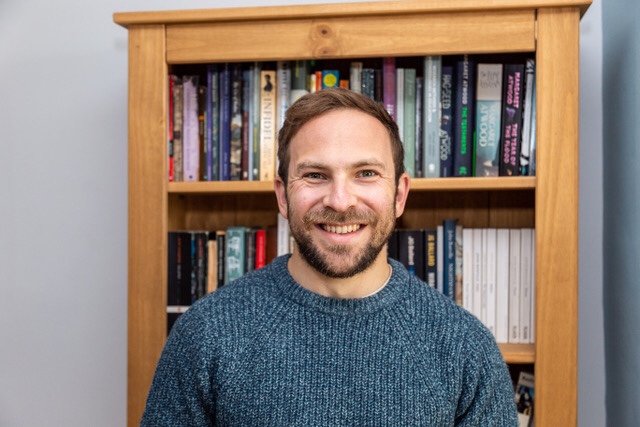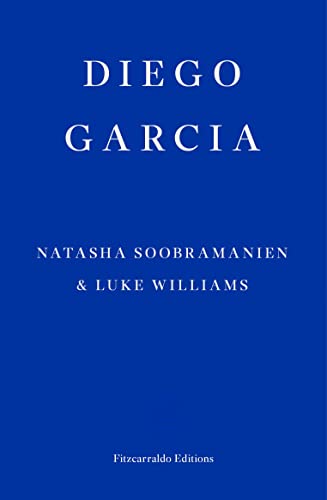In this form-breaking novel, Natasha Soobramanien and Luke Williams wowed judges of the Goldsmiths Prize by co-authoring a story of companionship and collectivity, even during pandemic lockdowns.
But they also related the recent colonial history of the Chagossian people and the Indian Ocean island of Diego Garcia: the forced evacuation of native peoples by the British ex colonists, and the installation of an airbase by the new, American inhabitants.
An overarching question throughout the book is whether it’s possible to ‘tell a story that needs to be shared, if it is not your story’, in a bid to write a ‘fiction of solidarity’.[1] In some ways, at the heart of this problem is the question of translation: How might I translate your story into my language? I don’t propose to answer that specific question, but instead I want to look at the issue of language more explicitly in the novel. We might then see whether we can take those ideas back into the idea of a ‘fiction of solidarity’.
Damaris and Oliver Pablo, the protagonists, are both writers. For a story that she submits to a magazine, Damaris writes an introductory letter that details how the Chagossian language of Kreol ‘was stolen by a political act whose violence traumatised into muteness robbed his mother of her speech language voice‘ (DG, pp. 157–8; emphasis original). Clearly, in line with the idea of an unused, underused, or made redundant language, these ideas point us towards postcolonial discourses.
However, we also come across the issue with language Daniel, Oliver Pablo’s late brother, who died by suicide. Daniel had been committed to a psychiatric hospital, but was let out because he requested it, ‘because he was white, middle class. Because he could speak [the medics’] language’ (DG, p. 173). By this exchange, we learn that the question of language is primarily a question of communication, of permissibility, and of accessibility.
Daniel as white and middle class can access all areas—even when he was locked in a protected environment. By contrast, Diego Garcia, who told his story in Kreol to Damaris, is excluded from his home space, with language his marker of exclusion, his unshakeable characteristic that disbars him.
In what has become a foundational text in translation studies, ‘The Task of the Translator’ (1923), Walter Benjamin wrote the following:
Translation is a mode. To comprehend it as mode one must go back to the original, for that contains the law governing the translation: its translatability. […] Translatability is an essential quality of certain works, which is not to say that it is essential that they be translated; it means rather that a specific significance inherent in the original manifests itself in its translatability.
Walter Benjamin, ‘The Task of the Translator’, in Illuminations, trans. Harry Zorn (London: Pimlico, 1999 [1955]), pp, 70–82 (p. 71)
Not only do I wonder whether Benjamin’s strictly literal meaning is applicable to a culturo-political situation—i.e. Damaris telling Diego’s story—but also whether Damaris’s story maintains any of the ‘specific significance inherent in [Diego’s] original’. Moreover, by translating (literally: dragging across) Diego’s story into English, into Britain (in fact, into an Edinburgh, where the first half of the story is set, whose own Scots language has been infiltrated and diminished by a colonising English), can Damaris communicate it to a wider audience and provide ‘access’ to those suffering Chagossians?
Similar questions were posed by and to Ciaran Carson, the late poet, when he translated Dante’s epic Inferno into English (2002). Carson, from a country (Ireland/Northern Ireland) and city (Belfast) riven apart by politics like Dante’s Florence, thought he found a comprehensible new home for Dante’s poetry in his own Hiberno-English, in his own land:
As I write, I can hear [a helicopter’s] ratchety interference in the distance; and, not for the first time, I imagine being airborne in the helicopter, like Dante riding on the flying monster Geryon, looking down into the darkness of that place in Hell called Malebolge. […] I see a map of North Belfast, its no-go zones and tattered flags, the blackened side-streets, cul-de-sacs and bits of wasteland stitched together by dividing walls and fences. For all the blank abandoned spaces it feels claustrophobic, cramped and medieval.
And:
When I began looking into the Inferno, it occurred to me that the measures and assonances of the Hiberno-English ballad might provide a model for translation.
Ciaran Carson, Inferno, pp. xxi–xxii, xx
For Carson, whose first language was Irish rather than English, there was a mutualistic dialogue made possible between post-Troubles Belfast and politically split, mediaeval Florence—made possible, that is, in and through translation. The Inferno gave voice to Carson’s Belfast; Carson’s Belfast gave voice to Dante’s Inferno. This is what we might cite as Benjamin’s ‘specific significance’ in the original that ‘manifests itself in the translation’.
This bilingualism is present in Diego Garcia. Writing from Brussells, Damaris tells Oliver Pablo that she ‘appreciate[s] its mutlivalency’ (DG, p. 189), whilst also noting that bilingualism is partial: Damaris’s flatmate who works ‘in the back of a bakery […] was cachée. In a limited vocabulary the words one knows beyond the everyday basics are telling’ (DG, p. 191). Here, again, we see the inaccessibility to those who are not fluent in the lingua franca.
Despite these repeated insistences that language can disbar and exclude, Damaris still hopes. In response to her own question, ‘What does a fiction of solidarity look like?’ she responds: ‘Maybe translation is one of the purest forms of writing as solidarity?’ And maybe, therefore, we arrive back at the beginning of our journey. If solidarity can take place through translation, then perhaps writing another’s story is possible. After all, the metafictional motif driving through the heart of Diego Garcia reminds us that this book is itself the fiction of solidarity that Damaris and Oliver Pablo are trying to write themselves.
But this answers the question about making something (a story; an idea) accessible to others, but not necessarily giving someone the same access. Indeed, Ngugi wa Thiong’o, famed Kenyan writer, offers a fatalistic alternative, with which I’ll finish. Following his declaration never again to write in English—and only to write in his native Gikuyu—he says:
Ngugi wa Thiong’o, Decolonising the Mind: The Politics of Language in African Literature (Oxford: James Currey, 1986), pp. 28–9)
So I would like to contribute towards the restoration of the harmony between all the aspects and divisions of language so as to restore the Kenyan child to his environment, understand it fully so as to be in a position to change it for his collective good. I would like to see Kenya peoples’ mother-tongues (our national languages!) carry a literature reflecting not only the rhythms of a child’s spoken expression, but also his struggle with nature and his social nature. With that harmony between himself, his language and his environment as his starting point, he can learn other languages and even enjoy the positive humanistic, democratic and revolutionary elements in other people’s literatures and cultures without any complexes about his own language, his own self.
In other words: only when translation is denied, forbidden, and forestalled, might translation become possible. Would this create a ‘fiction of solidarity’?
[1] Natasha Soobramanien and Luke Williams, Diego Garcia (Fitzcarraldo, 2022), pp. 252, 236. Hereafter, DG.


Leave a Reply